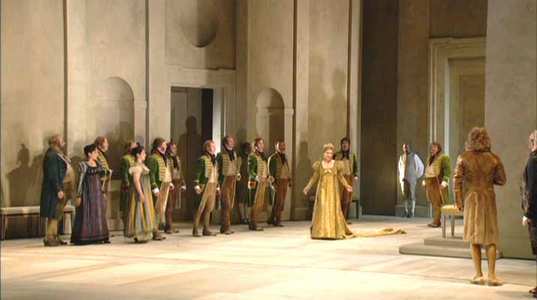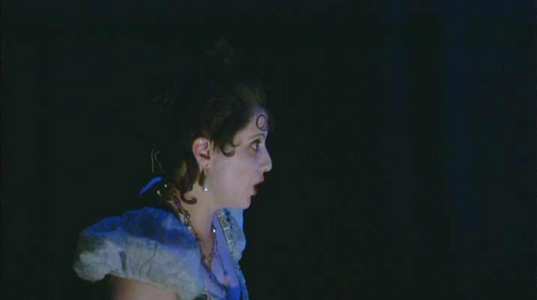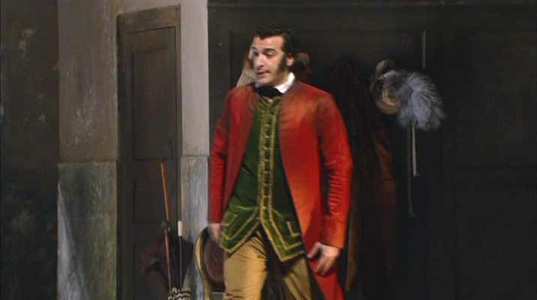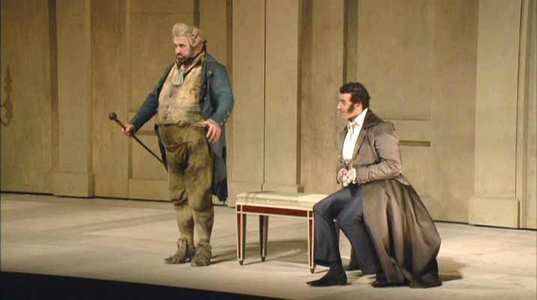Rossini: La Cenerentola (Jurowski)
Introduction
This is Rossini`s re-telling of the Cinderella story, but updated to the more politically-motivated 19th century ideals, with no fairy godmothers, glass slippers or mice turning into horses (or was it the other way around??).
Don Maginfico`s daughters (Clorinda and Tisbe - the supposedly `ugly` sisters) are doing themselves up for another day, and treating their step-sister Angelina (Cinderella - henceforth known as `Cinders`)
like the dirt they believe her to be. A beggar arrives (who is the Prince`s tutor, Alidoro, in disguise) asking for charity. Cinders offers him food and drink, which annoys her sisters intensely. It is announced that the Prince is holding a ball, at which he will decide upon a bride - and so all the most beautiful women in the land are invited (well, would you expect anything else?). Ths sisters become rather excited about this and wake their father, who tells them that he was just, by chance, dreaming of being a grandfather to kings.
Meanwhile, the Prince and his servant, Dandini, have swapped clothes and are now pretending to be each other. `Dandini` is introduced to Don Magnifico`s household after the announcement of the ball is made, and he and Cinders fall in love immediately - often helps to speed these things up in opera, I find.
Cinders manages to get herself dressed up and goes to the ball (with the assistance of Alidoro). Her appearance causes some consternation amongst certain guests, as she doesn`t half look like the skivvy `Cenerentola`.
The real Prince is so touched by Cinders` rejection of Dandini (still posing as the Prince himself) that he declares his love for her straight away and asks to marry her, but she has other ideas, and insists he takes one of her two bracelets, and must wait until he finds out who she really is before he makes such a decision.
Back at Don Magnifico`s house, the sisters find Cinders back at her usual duties, and laugh at the fact they thought there was any resemblance to the mysterious woman they saw at the ball in the first place. In the meantime, Alidoro has made sure that the Prince`s coach breaks down outside the house, therefore forcing a meeting between the Prince and Cinders - which funnily enough, means they fall in love all over again once he recognises her other bracelet.
They are married, all is forgiven etc etc etc

Video
The NTSC 16./9 anamorphic presentation is perfectly acceptable, and provides a very clean and watchable production. Sir Peter Hall`s production is very good, although is definitely not the camp romp which is promised in most panomimes of the story.

Audio
Sound-wise, I much preferred the DTS, although the stereo track is also very good.
The balance between the orchestra (with the pit being less cavernous than most) is fantastic. There was obviously a lot of work done here - but something we have come to expect from Glyndebourne productions. There are moments perhaps where the orchestra is a little too forward, but the detail is always there, and there is no overpowering of the singers.

Features
The main extra is a 25 minute `chat` featuring Hall and Jurowski (filmed seperately) explaining their thoughts on the piece. All quite interesting, but nothing devastatingly insightful which made me want to watch them again. Also Hall looks very uncomfortable in an ill-fitting suit - but that`s by the by.
Within the booklet, we also have a short essay on the opera by Professor David Osmond-Smith from the University of Sussex. Never heard of him before, but thought I`d give him a mention as it`s quite good, and well worth pinching if you happen to be studying this sort of thing and need to write an essay…although what are the chances of that I wonder?

Conclusion
Sir Peter Hall`s production is a very straightforward version of the story, but perhaps needed a bit of the old pantomime quality about it to reflect the genernal overall cheeriness of the music. As it is, everything looks rather dour and old, and a lot of the fun (admittedly over the top) you can find in the rival Houston Grand Opera DVD (Bruno Campanella conducting, with Cecilia Bartoli in the title role) is completely missing.
So, they all have to make up for it somewhere, and luckily it comes in the astonishing quality of the performances. Right from the start, Vladimir Jurowski manipulates the LPO into playing as if their lives depended upon it, and this continues throughout the opera.
On stage, the cast is equally impressive, with Ruxandra Donose (Cinders) performing out of her skin, and despite not being quite as technically articulate as Bartoli, she has none of the latter`s nasty habit of gurning throughout the tricky bits (and by God, there are loads of those!), but uses great style and sensitivity in the huge vocal range Rossini generally expects of his lead sopranos.
As I mentioned, the step-sisters are not at all like the `ugly` versions we expect, but two very beautiful, vain and cruel siblings played brilliantly Raquella Sheeran and Lucia Cirillo, although how they came to be sired by the revolting Don Magnifico (perhaps the nearest we come to absolute grotesqueness - helped enormously by Luciano di Pasquale`s portrayal) is anyone`s guess. Again, the role is perfectly conveyed but he does have a habit of overdoing the stereotypical vocal grunts that are the mainstay of pompous characters like this in opera. However, he is hilarious when communicating with Dandini (Simone Alberghini - with a very expressive comedic face) and so much can be forgiven.
Alidoro (Nathan Berg) is one of opera`s great schemers, and Berg brings a noble, but almost manacing tone to the part.
Finally, the Prince is played by Maxim Miranov, who honestly looks as if he hasn`t even started shaving yet, but has a very impressive voice, well suited to Rossini. I would have preferred he didn`t look as if he was concentrating so much about getting many of the florid passages right, as this made his acting seem wooden, but his diction is fantastic and can certainly belt out a good tune.
Overall, brilliantly performed by all, if a slightly dull production, but definitely a worthwhile rival to the Campanella/Bartoli disk (espcecially in sound and video quality).
Your Opinions and Comments
Be the first to post a comment!